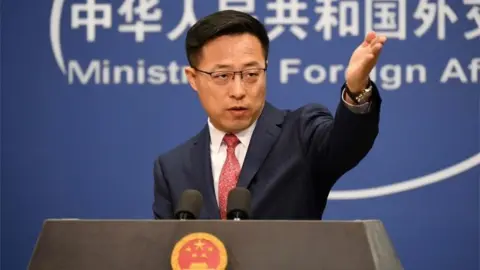China refuses to apologise to Australia for fake soldier image
 AFP
AFPChina has accused Australia of trying to "deflect public attention" from alleged war crimes by its soldiers in Afghanistan after Canberra expressed outrage over a "repugnant" tweet.
Australia wants China to apologise for sharing a fake image of an Australian soldier killing an Afghan child.
Beijing has now said that Australia was trying to "blame China for the worsening of bilateral ties".
Relations between the two nations have plummeted to a new low in recent days.
The tweet with the fake image was posted in response to a damning report last month about alleged Australian war crimes.
The Australian Defence Force said it had found "credible information" that 25 Australian soldiers were involved in the murders of 39 Afghan civilians and prisoners between 2009 and 2013.
On Monday, China joined in the widespread condemnation of the findings - now under police investigation - but the graphic doctored image shared by foreign ministry spokesman Lijian Zhao has triggered furious reactions in Canberra and beyond.
Australian Prime Minister Scott Morrison said Beijing should be "utterly ashamed" for sharing the "repugnant" image, demanding an apology.
The tweet has also prompted Jacinda Ardern, prime minister of neighbouring New Zealand, to raise its concerns with Beijing.
How was the Chinese tweet defended?
In its response on Tuesday, the Chinese embassy in Australia attacked Mr Morrison's remarks without offering an apology.
"The accusations made are simply to serve two purposes. One is to deflect public attention from the horrible atrocities by certain Australian soldiers. The other is to blame China for the worsening of bilateral ties. There may be another attempt to stoke domestic nationalism," it said in a statement.
"It's our advice that the Australian side face up to the crimes committed by Australian soldiers in Afghanistan, hold those perpetrators accountable and bring justice to the victims," the statement added.
Bilateral relations between China and Australia have been deeply strained this year after Canberra led calls for an inquiry into the origins of the Covid-19 pandemic.
A few months ago the last two correspondents working for Australian media in China were evacuated on the advice of diplomats.
More recently two Australian academics were banned from entering China.
How are Australia's allies responding?
Discussions about Beijing's alleged interference in Australian affairs have continued while economic tensions have grown with trade stoppages and tariffs imposed by China, including tariffs of up to 200% on Australian wine.
On Tuesday Prime Minister Ardern said New Zealand had directly raised concerns with Chinese authorities.
"It was an unfactual post, and of course that would concern us. So that is something we have raised directly in the manner that New Zealand does when we have such concerns," she told reporters in parliament in the capital Wellington.
China's tariffs have prompted an international pressure group of parliamentarians to campaign for people to buy Australian wine this month.
The Inter-Parliamentary Alliance on China tweeted a video of members calling for people to drink "a bottle or two" to show solidarity.
Allow X content?

